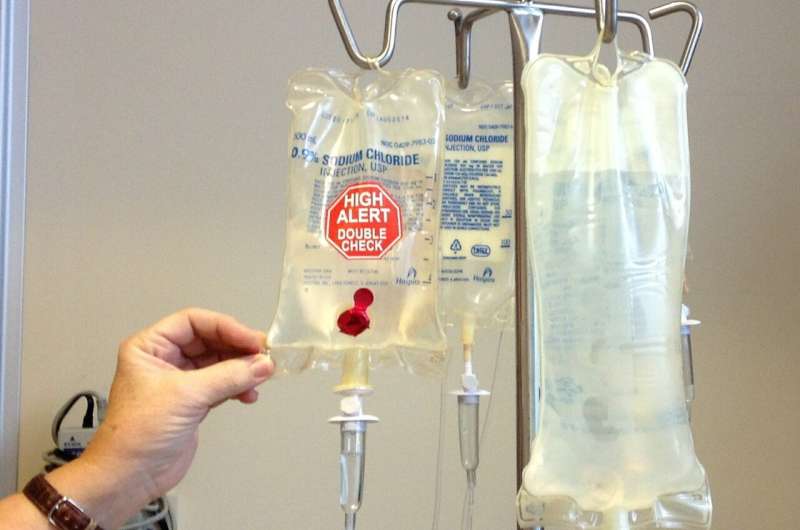
A large clinical trial has found that postmenopausal women with hormone receptor (HR)-positive, human epidermal growth factor receptor 2 (HER2)-negative breast cancer that has spread to as many as three lymph nodes and who have a 21-gene recurrence score (RS) of 25 or lower can safely skip having chemotherapy and only take endocrine therapy after breast cancer surgery. The results are published in the New England Journal of Medicine.
Initial results from S1007, the RxPONDER study, which was conducted by the SWOG Cancer Research Network, a cancer clinical trials group funded by the National Cancer Institute (NCI), part of the National Institutes of Health, were reported last December at the San Antonio Breast Cancer Symposium. Now additional data and analysis have strengthened these findings.
Researchers led by SWOG investigator Dr. Kevin Kalinsky, a breast medical oncologist at the Winship Cancer Institute at Emory University, compared rates of invasive disease-free survival (IDFS) – the percentage of women who remained alive without a recurrence of their cancer or a second invasive primary cancer—at five years after treatment assignment among patients enrolled to the study. When they looked at the overall study population, they saw no clinically relevant or statistically significant improvement in IDFS for women who got chemotherapy followed by endocrine therapy as compared to women who received endocrine therapy alone.
But when they looked at just the premenopausal women, who represented about one-third of the patients on the trial, a clear difference emerged. Among premenopausal women, those who received chemotherapy had a 40 percent relative improvement in IDFS compared to those who got endocrine therapy alone. By contrast, women on the trial who were postmenopausal had no benefit from chemotherapy.
“These are clinically meaningful and impactful data,” Kalinsky said. “As we saw that postmenopausal women with one to three positive nodes and RS 0 to 25 can likely safely forego adjuvant chemotherapy without compromising IDFS, this will save tens of thousands of women the time, expense, and potentially harmful side effects that can be associated with chemotherapy. Premenopausal patients with positive nodes and RS 0 to 25, however, likely benefit from chemotherapy.”
In premenopausal patients, the five-year IDFS rates were 89.0 percent for women who received endocrine therapy alone versus 93.9 percent for those on combined chemotherapy and endocrine therapy. In postmenopausal patients, the five-year IDFS rates were 91.9 percent versus 91.3 percent, a difference that was not statistically significant.
The 21-gene recurrence score test measures the expression level of a panel of 21 specific genes in tumor tissue to indicate a woman’s overall risk that her breast cancer will recur. Scores range from 0 to 100, and scores of 25 or lower are considered to indicate a low or intermediate risk of recurrence.
In approximately one-third of women diagnosed with HR+, HER2- breast cancer, cancer has already spread to their lymph nodes at the time of diagnosis. These women, whose cancer is known as node-positive disease, have a higher probability that their cancer will recur after treatment.
A retrospective analysis of data and biospecimens from an earlier SWOG study, S8814, had suggested that the 21-gene RS could be used to predict which women with cancer with these characteristics would benefit from having chemotherapy added to their endocrine therapy. In that analysis, women with an RS of less than 18 saw no benefit from the addition of chemotherapy, whereas those with an RS of at least 31 lived longer if they had chemotherapy.
The RxPONDER trial was conducted to try to definitively answer the question of whether RS could be used to predict which women with HR+, HER-, node-positive breast cancer would benefit from chemotherapy. Study researchers at 632 sites in nine countries enrolled 5,083 women with this cancer and with an RS of 25 or less, randomly assigning one-half to receive chemotherapy followed by endocrine therapy after their surgery and the other half to receive endocrine therapy alone after surgery.
As a secondary endpoint, the team analyzed distant disease-free survival (DDFS) in these patients and found a 42 percent relative improvement due to chemotherapy in premenopausal women but no difference in DDFS attributable to chemotherapy in postmenopausal women. DDFS differs from IDFS in that it accounts only for distant recurrence of the cancer or death, not for local or regional recurrence of breast cancer or for new invasive primary cancers.
In additional post hoc analyses reported in the paper, the researchers grouped premenopausal patients receiving chemotherapy into four groups by increasing 21-gene RS—<10, 11-15, 16-20, and 21-25—and evaluated their IDFS at five years after randomization. They found that while the relative benefit of chemotherapy did not increase as RS increased from 0 to 25, the absolute benefit was greater in those patients with a higher RS.
They also found that among premenopausal women aged 50 or younger, even those with the lowest RS scores still benefited from having chemotherapy in addition to endocrine therapy.
“These data further help individualize the discussion of risk and benefit of chemotherapy with premenopausal patients with up to three lymph nodes and an RS of 25 or less,” Kalinsky said.
Source: Read Full Article